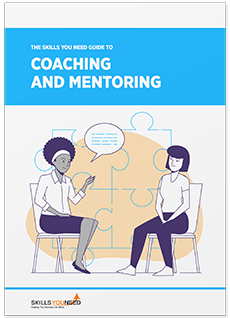When Is Executive Coaching
Not Executive Coaching?
See also: Coaching Skills
Ever been in a relationship that doesn’t quite have that spark? I’m talking professionally of course, but whenever we talk to people who are coming out of a bad coaching relationship, there are often parallels with romantic partnerships — not least the importance of finding someone who’s right for you, and recognising when it isn’t working.
One thing to note is that the industry is still unregulated, so you’ve got all sorts out there vying for your business. That means absolutely anyone can call themselves an executive coach, even your nan, but they won’t all be good at it!
We’ve been supporting executives for over 25 years now, all over the world, so we feel we have a good handle on what it takes to do the job well.
But here’s our best advice on how to filter out the not-so-good ones:
1. They don’t ask questions.
A mistake novice coaches often make is to assume that coaching is about imparting opinions or skills; it’s not.
It’s about helping the coachee to analyse their behaviours and actions with insightful, powerful questions and feedback. Coaching can introduce models or concepts that help an executive align their thinking, but if your coach is simply giving you tips and guidance on things, they really aren’t doing their job properly.
However, it’s not simply a matter of firing questions either — that can feel pretty intimidating, which isn’t a good way to get the best out of people. It’s more a case of knowing the types of questions to ask to guide the coachee towards a solution — which can be a quite nuanced process — and how to phrase them. “How?” for example, is a lot less confrontational than “Why?”.
2. They don’t click with the person they’re coaching.
This isn’t always the fault of the coach, of course — it might just be that they’re not the right one for that person.
That’s why all Connor coaches are carefully paired with the client, to make sure that they have the right authority, presence, and personality to get the most out of the them. If your executive coach is someone you feel no connection with, they will struggle to get the most out of you.
We like to get it right first time, but that’s not always possible. We do pride ourselves though on always getting it right the second time — the last thing executives need or have time for is a beauty parade of potential coaches.
3. They aren’t professionally qualified.
While the industry isn’t regulated, there are qualifications that indicate a level of training and competence.
Look for accreditation or membership of professional coaching organisations such as the Association for Coaching (AC), or the International Coaching Federation (ICF) or the European Mentoring and Coaching Council (EMCC) when assessing potential executive coaches.
It’s not that unqualified coaches are all bad – some people are naturals. But a qualification is at least an indicator of quality. To further make sure you’re working with someone who can offer you real value, ask for testimonials or previous experience. What styles or models or concepts do they embrace? NLP? Transactional analysis? Something else? These will not only give you an idea of quality, but an idea of whether the coach is someone you will enjoy working with.
4. They don’t take into account the needs of your organisation.
Executive coaching isn’t life coaching, it’s a service that is designed to help an executive thrive in their organisation.
With that in mind, executive coaching needs to start with a three-way agreement between the coach, the person being coached, and a representative of the organisation — that could be a manager or someone else in the organisation who is acting as a sponsor if it’s the CEO who’s being coached.
Without that bird’s-eye view, the executive might feel the sessions have been very useful, only to find that when they get back into their work, they are no better off.
So that’s the bad and the ugly, what about the good?
It’s useful to know what to avoid when looking for an executive coach, but let’s finish on a more positive note: how can you track down a coach who isn’t just good, but great?
The first thing I suggest is to challenge your preconceptions of what a coach looks like. For example, even though some people insist on it, the best coach for an executive doesn’t have to be a peer, or even work in the same industry. In fact, someone with a very different background might be in a better position to help open up new perspectives and thoughts. Personality, rigour and the ability to challenge are much more important matches than industry sector and seniority.
Next, look for that business focus. When coaches can successfully dovetail the various needs and goals of the individual and the organisation, the coachee is able to not only advance their own career ambitions, but also make a positive impact on the business —now and in the future. And ultimately, that’s why you’re investing in executive coaching.
Finally, look at their personal attributes —qualifications, questioning style, personability, and so on. Do they inspire confidence and brilliance or is their approach somewhat formulaic?
So there you have it: executive coaching needs to be question-based, run by a coach who is professionally qualified, focused on the mindset and behaviours that lead to success, and sensitive to the needs of the business. Put all that in place and you’re much less likely to find yourself in a nightmare relationship.
Further Reading from Skills You Need
The Skills You Need Guide to Coaching and Mentoring
Coaching and mentoring require some very specific skills, particularly focused on facilitating and enabling others, and building good relationships. This eBook is designed to help you to develop those skills, and become a successful coach or mentor.
This guide is chiefly aimed at those new to coaching, and who will be coaching as part of their work. However, it also contains information and ideas that may be useful to more established coaches, especially those looking to develop their thinking further, and move towards growing maturity in their coaching.
About the Author
Kim Foster, People and Change Director

Kim joined Connor in 2016 as the People Development Practice Manager, where she was responsible for the day-to-day running of the practice. She is also a consultant and accredited VoicePrint coach, designing and delivering high-value development interventions for organisations, teams and individuals.
Kim is an active member of the CIPD and holds a post-graduate diploma in HR management. She has a strong generalist HR background and has worked in large corporate organisations, including Home Retail Group.


